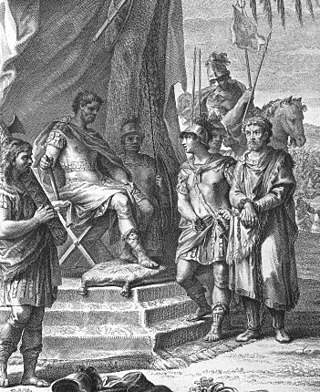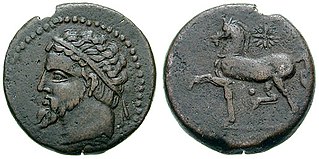This article concerns the period 119 BC – 110 BC.
108 BC was a year of the pre-Julian Roman calendar. At the time it was known as the Year of the Consulship of Galba and Hortensius/Scaurus and the Third Year of Yuanfeng. The denomination 108 BC for this year has been used since the early medieval period, when the Anno Domini calendar era became the prevalent method in Europe for naming years.
Year 118 BC was a year of the pre-Julian Roman calendar. At the time it was known as the Year of the Consulship of Cato and Rex and the Fifth Year of Yuanshou. The denomination 118 BC for this year has been used since the early medieval period, when the Anno Domini calendar era became the prevalent method in Europe for naming years.

Numidia was the ancient kingdom of the Numidians in northwest Africa, initially comprising the territory that now makes up Algeria, but later expanding across what is today known as Tunisia and Libya. The polity was originally divided between the Massylii state in the east and the Masaesyli in the west. During the Second Punic War, Masinissa, king of the Massylii, defeated Syphax of the Masaesyli to unify Numidia into the first unified Berber state for Numidians in present-day Algeria. The kingdom began as a sovereign state and an ally of Rome and later alternated between being a Roman province and a Roman client state.

Gaius Marius was a Roman general and statesman. Victor of the Cimbric and Jugurthine wars, he held the office of consul an unprecedented seven times. Rising from a family of smallholders in a village called Ceraetae in the district of Arpinum, Marius acquired his initial military experience serving with Scipio Aemilianus at the Siege of Numantia in 134 BC. He won election as tribune of the plebs in 119 BC and passed a law limiting aristocratic interference in elections. Barely elected praetor in 115 BC, he next became the governor of Further Spain where he campaigned against bandits. On his return from Spain he married Julia, the aunt of Julius Caesar.

Jugurtha or Jugurthen was a king of Numidia. When the Numidian king Micipsa, who had adopted Jugurtha, died in 118 BC, Jugurtha and his two adoptive brothers, Hiempsal and Adherbal, succeeded him. Jugurtha arranged to have Hiempsal killed and, after a civil war, defeated and killed Adherbal in 112 BC.

Marcus Aemilius Scaurus was a Roman statesman who served as consul in 115 BC. He was also a long-standing princeps senatus, occupying the post from 115 until his death in late 89 or early 88 BC, and as such was widely considered one of the most prestigious and influential politicians of the late Republic.

Adherbal, son of Micipsa and grandson of Masinissa, was a king of Numidia between 118 and 112 BC. He inherited the throne after the death of his father, and ruled jointly with his younger brother Hiempsal, and Jugurtha, the nephew of Masinissa. After the murder of his brother by Jugurtha, Adherbal fled to Rome and was restored to his share of the kingdom by the Romans in 117 BC, with Jugurtha ruling his brother's former share. But Adherbal was again stripped of his dominions by Jugurtha and besieged in Cirta, where he was killed by Jugurtha in 112 BC, although he had placed himself under the protection of the Romans.

The Jugurthine War was an armed conflict between the Roman Republic and King Jugurtha of Numidia, a kingdom on the north African coast approximating to modern Algeria. Jugurtha was the nephew and adopted son of Micipsa, king of Numidia, whom he succeeded on the throne, he had done so by overcoming his rivals through assassination, war, and bribery.
Publius Rutilius Rufus was a Roman statesman, soldier, orator and historian of the Rutilia gens, as well as a great-uncle of Gaius Julius Caesar. He achieved the highest political office in the Roman Republic when he was elected consul in 105 BC.
Quintus Caecilius Metellus Numidicus was an ancient Roman statesman and general. He was a leader of the Optimates, the conservative faction of the Roman Senate. He was a bitter political opponent of Gaius Marius. He was consul in 109 BC; in that capacity he commanded the Roman forces in Africa during the Jugurthine War. In 107 BC, he was displaced from his command by Marius. On his return he was granted a triumph and the agnomen Numidicus. He later became a censor, entering into exile in opposition to Marius. Metellus Numidicus enjoyed a reputation for integrity in an era when Roman politics was increasingly corrupt.
The Battle of the Muthul was fought at the Muthul River in Numidia in 109 BC. The Numidians, led by their king Jugurtha, fought a Roman army commanded by the consul Quintus Caecilius Metellus Numidicus. The battle was fought during the Jugurthine War, a war between King Jugurtha of Numidia and the Roman Republic. The battle was indecisive - it took the Romans four more years to defeat Jugurtha. Jugurtha was eventually captured by Lucius Cornelius Sulla in 105 and executed during Marius' Triumphal parade a year later (104). The Roman historian Publius Rutilius Rufus distinguished himself during the battle, while Gaius Marius' military genius shone through for the first time, saving the day for the Romans.

Micipsa was the eldest legitimate son of Masinissa, the King of Numidia, a Berber kingdom in North Africa. Micipsa became the King of Numidia in 148 BC.
Hiempsal I, son of Micipsa and grandson of Masinissa, was a king of Numidia in the late 2nd century BC.
Vaga, Vecca and lately Theodorias is an ancient city in Tunisia built by the Berbers and ruled sequentially by the Carthaginians, the Numidians, the Romans, the Vandals and the Byzantines until it was captured by the Arabs who changed its name to the present day Béja. The town was the capital of the Numidian Kingdom during the rule of Jugurtha.
The siege of Cirta was fought between the rival Numidian kings Adherbal and Jugurtha in 113 BC. They were contesting the throne of Numidia after the death of King Micipsa. Jugurtha invaded Adherbal's territory, defeated him and besieged him in his capital Cirta. Two Roman deputations attempted to negotiate a settlement, but Jugurtha ignored them. When the city surrendered he tortured Adherbal to death and executed all who had bourne arms against him, including numerous Romans. This last action was to spark the outbreak of the Jugurthine War between Rome and Numidia.
The Second Battle of Cirta, part of the Jugurthine War, was fought in 106 BC between a Numidian-Mauretanian coalition and a Roman army near the Numidian capital of Cirta. The Numidians were led by King Jugurtha, the Mauritanians were led by king Bocchus while the Romans were under the overall command of Gaius Marius who was supported by his quaestor Lucius Cornelius Sulla as cavalry commander. The Romans were victorious routing their opponents and capturing Cirta.
The siege of the fortress at Muluccha, part of the Jugurthine War, was an investment of a Jugurthine fortress by a Roman army in 106 BC. The Romans were commanded by Gaius Marius, the Numidians by an unknown commander. The Romans' main objective was to capture one of king Jugurtha's treasuries which was reported to be inside the fortress. Marius besieged the fortress town and finally took it by trickery.
The siege of Zama, part of the Jugurthine War, was an investment of the Numidian town of Zama by a Roman army. The Romans were commanded by Quintus Caecilius Metellus, one of the consuls of 109 BC, while the Numidians were under the overall command of Jugurtha, the king of Numidia. The Romans' main objective was to lure Jugurtha into a set-piece battle; the Numidians had been wearing down the Roman legions by guerilla warfare and the Roman commander hoped the siege would pressure the Numidian king into giving battle. Jugurtha did not let himself be goaded into a pitched battle and kept up his opportune attacks while the defenders of Zama kept the Romans at bay. Failing to take the city and failing to provoke the Numidian king into entering a set-piece battle, the Romans gave up on the siege and marched back to the Roman province of Africa.

The Bellum Jugurthinum is an historical monograph by the Roman historian Sallust, published in or around 41 BC. It describes the events of the Jugurthine War between the Roman Republic and King Jugurtha of Numidia. Sallust alleges that Jugurtha was able to repeatedly bribe corrupted Roman officials during the war, which Sallust took as indicative of a broader moral decline in the late Republic. In this way, the Bellum Jugurthinum is thematically similar to Sallust's first monograph, the Bellum Catilinae. The Bellum Jugurthinum is the main historical source for the Jugurthine War.








